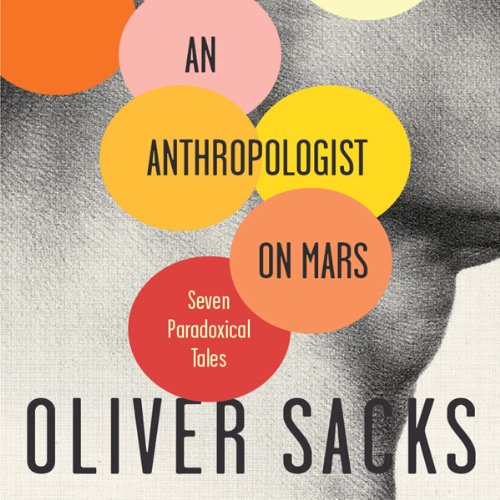Oliver Sacks’s “An Anthropologist on Mars” audiobook explores seven fascinating neurological cases. Each story reveals unique insights into the human mind.
Oliver Sacks, a renowned neurologist, delves deep into the complexities of the human brain in “An Anthropologist on Mars”. This audiobook presents seven case studies of individuals with extraordinary neurological conditions. Sacks’s compassionate and insightful narrative brings each story to life, offering a glimpse into the lives of those living with unusual brain disorders.
His storytelling combines medical expertise with a deep understanding of human experience. This audiobook is both informative and engaging, making complex neurological concepts accessible to all listeners. Ideal for those interested in psychology, medicine, or simply the mysteries of the human mind.

The Life And Legacy Of Oliver Sacks
Oliver Sacks was an extraordinary neurologist and author. His work has touched many lives. This blog explores his life, career, and literary legacy.
Career Milestones And Contributions To Neurology
Oliver Sacks made significant contributions to neurology. He began his career in the 1960s. He worked with patients suffering from rare neurological disorders. His book Awakenings highlighted his work with encephalitis lethargica patients. This book later became a famous movie starring Robin Williams.
Sacks explored the human brain’s mysteries. He documented his findings in clinical case studies. His work with patients showed his compassion. He treated each patient as an individual with a unique story.
Literary Works And Storytelling Approach
Oliver Sacks was not just a neurologist. He was also a gifted storyteller. His books are engaging and accessible to all. He wrote about real-life cases in a narrative style. This made complex topics easy to understand.
Some of his famous books include The Man Who Mistook His Wife for a Hat and An Anthropologist on Mars. Each book is a collection of fascinating case studies. Sacks had a unique way of blending science and storytelling. He made readers feel connected to his patients.
Here is a table highlighting some of his most influential works:
| Book Title | Publication Year | Theme |
|---|---|---|
| Awakenings | 1973 | Encephalitis lethargica patients |
| The Man Who Mistook His Wife for a Hat | 1985 | Unusual neurological disorders |
| An Anthropologist on Mars | 1995 | Case studies of extraordinary patients |
Oliver Sacks’ legacy lives on through his books and research. He has inspired many to learn more about the human brain. His stories remind us of the beauty and complexity of the mind.
Diving Into ‘an Anthropologist On Mars’
Oliver Sacks’ audiobook, ‘An Anthropologist On Mars’, takes listeners on a journey through the minds of individuals with unique neurological conditions. This collection of seven fascinating stories helps us understand the human brain’s complexity.
Book Synopsis And Central Themes
‘An Anthropologist On Mars‘ explores seven real-life cases. Each story delves into extraordinary neurological conditions. From a painter who loses color vision to a surgeon with Tourette’s syndrome, Sacks illuminates the resilience of the human spirit.
Central themes include:
- Neurodiversity: The variety of human minds and experiences.
- Adaptation: How individuals adapt to their unique conditions.
- Identity: How neurological differences shape personal identity.
These themes challenge our understanding of normalcy and difference.
Critical Reception And Impact
The audiobook received widespread acclaim. Critics praised Sacks’ empathetic storytelling. His ability to humanize complex medical conditions stood out.
| Publication | Review Summary |
|---|---|
| The New York Times | Praised the book’s depth and compassion. |
| Publishers Weekly | Highlighted Sacks’ engaging writing style. |
The impact of ‘An Anthropologist On Mars‘ extends beyond literature. It fosters greater awareness and understanding of neurological diversity. Medical professionals, educators, and general readers alike find value in Sacks’ insights.
This audiobook serves as a powerful reminder of the human brain’s wonders.
The Audiobook Experience
Listening to Oliver Sacks – An Anthropologist On Mars Audiobook is a unique adventure. The audiobook brings Sacks’ fascinating case studies to life. Let’s delve into the key elements that make this audiobook a must-listen.
Narration Style And Voice
The narration style is clear and engaging. The narrator’s voice is soothing and authoritative. This helps listeners stay focused and interested. The narrator uses different tones for each case study. This makes the audiobook more dynamic and enjoyable.
The narrator also pauses at the right moments. This gives listeners time to absorb the information. The combination of a clear voice and varied tones enhances the listening experience.
Audio Production Quality
The audio production quality is top-notch. The sound is crisp and free from background noise. Each chapter flows smoothly into the next. This seamless transition keeps the listener engaged from start to finish.
High-quality audio ensures that every word is heard clearly. This is crucial for understanding Sacks’ complex subjects. The audiobook also features balanced sound levels. This makes it easy to listen to, whether at home or on the go.
| Element | Description |
|---|---|
| Narration Style | Clear, engaging, and varied tones |
| Voice | Soothing and authoritative |
| Audio Quality | Crisp, free from background noise |
| Sound Levels | Balanced for easy listening |
In summary, the audiobook experience of Oliver Sacks – An Anthropologist On Mars is exceptional. Its narration style and audio quality make it a compelling listen.

Case Studies Explored
Oliver Sacks’ audiobook, An Anthropologist On Mars, delves into fascinating case studies. These cases highlight the unique experiences of individuals with neurological disorders. The book reveals how these conditions shape their lives and perspectives. Let’s explore the intriguing case studies presented in this audiobook.
Profiles Of Neurological Uniqueness
Each chapter in the audiobook profiles a person with a rare neurological condition. These profiles offer a deep understanding of how the brain can shape behavior and perception. The cases include:
- The Colorblind Painter: A man loses the ability to see color after a car accident.
- The Last Hippie: A man with a brain tumor who thinks he is still in the 1960s.
- The Surgeon with Tourette’s: A skilled surgeon who has Tourette’s syndrome.
Humanizing Neurological Disorders
Sacks’ work humanizes those with neurological disorders. He shows their strengths and challenges. The audiobook highlights their unique talents and perspectives. This approach fosters empathy and understanding.
For example, the case of the blind painter reveals how blindness can enhance other senses. The autistic savant case shows extraordinary memory and artistic skills. These stories inspire and educate the listener.
Through these detailed profiles, Sacks bridges the gap between science and human experience. The audiobook is a journey into the complexities of the human brain. It showcases how neurological differences contribute to the rich tapestry of human life.
Sacks’ Exploration Of Perception
Oliver Sacks’ audiobook, “An Anthropologist On Mars”, delves into the complexities of human perception. Sacks investigates how people perceive the world differently. His work highlights unique neurological conditions. He brings stories of individuals with extraordinary minds to life.
Challenges To Traditional Views
Sacks challenges the traditional views of perception. He explores cases that defy standard neurological explanations. These stories question what we know about the brain.
- Case of the Colorblind Painter
- Man Who Mistook His Wife for a Hat
- Prodigies with Autism
Each case redefines our understanding of sensory experiences. The audiobook provides rich insights into these unique minds.
Insights Into The Human Mind
Sacks’ work offers deep insights into the human mind. His stories reveal the brain’s adaptability and resilience. He shows how people can thrive despite neurological challenges.
- Understanding Visual Agnosia
- Exploring Synesthesia
- Living with Tourette’s Syndrome
These insights enrich our knowledge of human capabilities. Sacks’ exploration makes us rethink the limits of perception.

Cultural And Ethical Perspectives
Oliver Sacks’ audiobook, An Anthropologist On Mars, dives deep into human experience. The book explores the lives of people with unique neurological conditions. These stories offer rich cultural and ethical insights. Sacks highlights the beauty of neurodiversity and the moral complexities of research.
Neurodiversity And Society
Neurodiversity celebrates the variety of human minds. It challenges the idea of a ‘normal’ brain. Sacks’ work shows the value of different ways of thinking. People with neurological differences contribute uniquely to society.
- Temple Grandin – An autistic professor who revolutionized animal science.
- Stephen Wiltshire – An artist with an extraordinary photographic memory.
- Gregg Mozgala – An actor with cerebral palsy who redefines performance art.
These individuals demonstrate that differences can be strengths. Society benefits from embracing neurodiversity.
Ethics In Neurological Research
Research in neurology often faces ethical dilemmas. Sacks discusses these issues with sensitivity. He emphasizes the need for informed consent. Participants must understand the risks and benefits.
| Ethical Principle | Explanation |
|---|---|
| Informed Consent | Participants should know all aspects of the research. |
| Privacy | Researchers must protect personal information. |
| Beneficence | Research should aim to benefit participants and society. |
Sacks highlights the importance of ethical practices. Respecting participants ensures trust and integrity in research.
Reader And Listener Engagement
Engaging with the audiobook “Oliver Sacks – An Anthropologist On Mars” is a unique experience. The narrative draws you into the lives of individuals with extraordinary neurological conditions. The storytelling connects deeply with both readers and listeners, creating an immersive journey through the human mind.
Connecting With The Narratives
Each story within the audiobook presents a unique perspective. These narratives bridge the gap between science and human experience. Listeners feel connected to the characters and their journeys. The detailed descriptions and personal insights help create a vivid mental picture. This connection keeps the audience engaged throughout the audiobook.
Oliver Sacks narrates the stories with great care. His voice adds depth to each character’s experience. Listeners can easily follow along, even during complex medical explanations. This makes the audiobook accessible to a wider audience.
| Element | Effect |
|---|---|
| Detailed Descriptions | Creates vivid mental images |
| Personal Insights | Deepens emotional connection |
| Sacks’ Narration | Adds depth and clarity |
The Role Of Empathy In Storytelling
Empathy plays a crucial role in storytelling. Sacks’ empathetic approach allows listeners to truly understand the experiences of his subjects. His compassionate narration brings out the humanity in each story. This helps listeners relate to the characters, even if they have never encountered similar situations.
The use of simple language ensures the stories are easy to follow. This enhances the emotional connection and keeps the audience engaged. By focusing on the human aspect, Sacks turns complex medical cases into relatable stories.
- Empathetic Approach: Helps listeners connect emotionally
- Simple Language: Ensures easy understanding
- Human Focus: Makes stories relatable
Beyond The Book
Oliver Sacks’ “An Anthropologist On Mars” audiobook is more than a collection of case studies. It has influenced many fields beyond medicine. This section explores its impact on both medicine and art.
Influence On Medicine And Art
Oliver Sacks was a neurologist, but his work reached far beyond. His stories have impacted the medical world in profound ways. Doctors and students read his work to understand patients better.
The audiobook also touches the world of art. Sacks wrote about artists who saw the world differently. He showed how their conditions shaped their creativity. This has inspired many in the art community to look deeper into the mind’s role in art.
Continuing The Conversation
“An Anthropologist On Mars” started many important conversations. People still talk about the book’s stories today. The audiobook has made these stories even more accessible.
Fans of Sacks often discuss his work online. They share their thoughts and insights. This keeps Sacks’ legacy alive and growing. The audiobook helps new listeners join this ongoing conversation.
Frequently Asked Questions
What Is “an Anthropologist On Mars” About?
“An Anthropologist On Mars” is a collection of seven neurological case histories by Oliver Sacks. Each story explores the lives of individuals with unique neurological conditions, providing insights into their experiences and challenges.
Who Narrated The Audiobook?
The audiobook of “An Anthropologist On Mars” is narrated by Jonathan Davis. His engaging narration brings Oliver Sacks’ detailed and empathetic storytelling to life.
Is The Audiobook Unabridged?
Yes, the audiobook is unabridged. It includes the complete text of Oliver Sacks’ book, ensuring you don’t miss any details of the fascinating case studies.
Where Can I Listen To The Audiobook?
You can listen to the audiobook on platforms like Audible, Amazon, and Google Play. These platforms offer a seamless listening experience on various devices.
Conclusion
Discover the profound insights of Oliver Sacks in “An Anthropologist On Mars” audiobook. His narratives captivate and educate, offering a unique view on human neurology. Dive into these compelling stories and broaden your understanding. Experience the brilliance of Sacks’ work, and enrich your perspective on the human mind.



